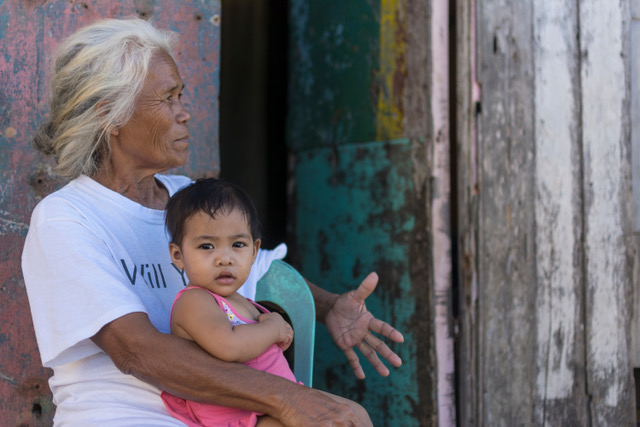Imagine not being able to watch your child grow up. This is the reality of countless Filipino mothers and fathers. As Family Day in Canada approaches, it brings to mind the growing number of Filipino workers, many of whom are parents, who sacrifice the familial union of this holiday to work abroad.
Approximately, 1.96 million Filipino workers worked abroad in 2022, where the majority consisted of women workers. As well, the total amount of money sent or brought home was around 197.47 billion pesos (roughly $4.9 billion Canadian dollars). As the Philippine economy struggles to provide enough employment to their growing labour work force, these statistics suggest that many of these workers pursue (higher-paying) job opportunities overseas with the goal of providing financial security and support to their children back home.
Sadly, working abroad means that these parents will be supporting their family from afar at the cost of being physically absent throughout their child’s life. Considering how this parental absence can have significant impacts on children’s development, it is reasonable to consider whether the sacrifice is worth it for these workers. While parents’ efforts may provide some significant benefits to their children and families, it does not produce a permanent solution to the systematic issues that disrupt Filipino families in the first place.
The decision to work overseas can complicate the relationship dynamics between the child left behind and the parent(s) working abroad. Filipino children with mothers working abroad have reported facing devastating emotional challenges including insecurity, loneliness, and a yearning for their mother’s intimacy. These children struggled to recognize their mother’s commoditized sacrifices as signs of love – while also cherishing the material goods (i.e. toys) they send home – and viewed their mothers as preferring money over family. This seems to pervade these parent-child relationships with a concoction of resentment and appreciation.
Beyond the sea, Filipino parents are also no strangers to the emotional pain associated with this distance. Filipina mothers working abroad have reported feeling helpless, guilty, and lonely, as the sometimes several-year long separation may lead mothers to miss their children’s developmental milestones. This impacts a mother’s perceived closeness and relationship quality with her child, which often drives her to counteract the absence through gifting material goods, reassuring them of the security that these sacrifices bring to their loved ones.
The efforts of Filipino parents working abroad do bring some benefit
Research has found that when assessing Filipino left-behind children’s educational attainment in elementary school (aged 9-15), there were slight decreases in children’s education performance when both parents were working abroad – compared to non-migrant, present parents. In particular, the mother’s absence had a stronger negative effect, compared to the father’s absence, on children’s school performance which may be due to Filipina mothers primarily holding the roles of family preservation and childrearing.
There seemed to be a shift when children turned 19-21 years old. Research found that when only mothers were working overseas, there was an increase in enrollment of college and total number of years enrolled in school, compared to when both parents were present.
Specifically, left-behind daughters had greater education attainment as opposed to sons, possibly due to the heightened expectation for daughters to study, work, and care for their aging parents. For left-behind sons, greater and more frequent remittance income from both parents working abroad increased their chances of graduating from high school and staying enrolled in college.
What’s the key to their success?
On average, 4.1 people lived in Philippine households in 2022, with multigenerational households as one of the most common family structures. The educational success of left-behind children may be due to the parental gap that extended family members fill – rooted in traditional family-oriented values – and Filipinos’ strong values on high education attainment.
But this is not the full story.
Filipino parents often seek overseas employment to raise their children’s educational opportunities, enabling them to attain higher education and well-paying jobs to escape poverty. However, the academic degrees of these now left-behind graduates may not be enough to establish financial stability. Consequently, this generation may be driven to work abroad to support their future families as well as their parents after they return home from their work overseas.
It is a generational cycle of overseas employment.
Recently, the Canadian government has implemented a new pilot program that expedites the recruitment of, specifically, Philippine workers into industries like healthcare and agriculture. Despite the increased job opportunities, this may exacerbate the intergenerational cycle of working abroad and perpetuate the separation of Filipino families.
Although parenting abroad keeps Filipino families somewhat afloat, it’s not an effective solution for future generations to live and work comfortably in their home country. Instead, it tears families apart to compensate for an issue that is not fundamentally theirs to solve – reflecting societal complications with the Philippine economy.
But there is hope for the Philippines
China implemented the Youth Thousand Talents Program and other policies such as institutional recruitment and financial support for returnees which attracted numerous emigrated citizens to return to their families and work back home. South Korea advanced their STEM industries; India provided greater career options through developing pharmaceutical companies; and Taiwan strengthened their technology and research institutions. All of these initiatives developed economic stability to increase job opportunities and quality of life for students and workers.
Parents should not feel compelled to abandon their children for a future that cannot guarantee life-long stability. Countries can introduce policies that satisfy the economic, educational, and living demands of families. To break the Philippine intergenerational loop, it’s time for the Philippine government to introduce proactive economic interventions that keep Filipino families close together and close to home.
Janelle Alegre is a Filipino Canadian writer studying at the University of British Columbia where she is pursuing a major in Psychology and a minor in Family Studies. With a strong passion for supporting marginalized youth populations and music, she is a program director and music educator in the non-profit MusicBox Children’s Charity organization, providing Vancouver’s vulnerable youth with music education lessons. Her goal is to provide mental health guidance and support to children and families who face socioeconomic challenges, strengthening familial support systems in a way that fosters healthy child development.


